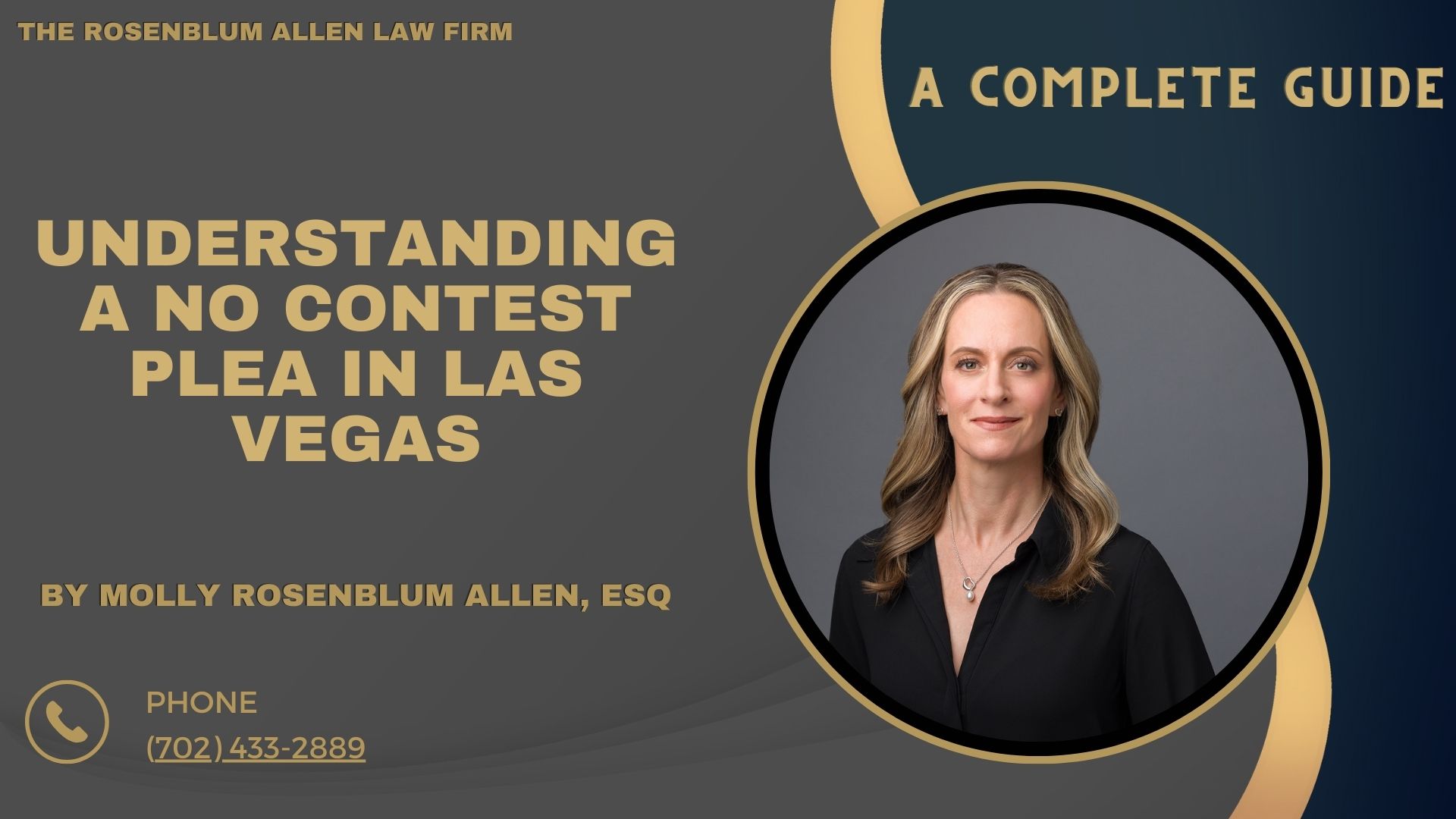Welcome to the bustling city of Las Vegas. Its complex laws match only the bright lights and lively atmosphere here. Whether you’re a resident or just passing through, you must know legal terms. For example, “no contest plea.” This guide will explain what a no-contest plea means in Las Vegas. It will cover why someone might choose this option and how it impacts the legal proceedings.
Las Vegas is known for its vibrant nightlife and bustling casinos. Its legal system handles many cases every day. The legal world has many terms and proceedings. The “no contest plea” is a key option for defendants. This guide aims to explain what a no-contest plea means. It covers its implications and why it’s a big part of Las Vegas’s legal system.

 The Basics of a No Contest Plea
The Basics of a No Contest Plea
When faced with criminal charges, understanding your plea options is crucial. A no-contest plea is also known as “nolo contendere.” It is a unique choice with specific implications.
Definition of a No Contest Plea
A no-contest plea is neither an admission of guilt nor a declaration of innocence. It tells the court you choose not to contest the charges against you without admitting guilt. This plea is significant in the legal system for several reasons.
Differences between guilty, not guilty, and no contest pleas
Guilty: Admitting to the crime, accepting all legal consequences.
Not Guilty: Denying the charge, leading to a trial to determine innocence or guilt.
No Contest: Not admitting guilt but accepting conviction without contesting the charges.
Legal Implications of a No Contest Plea in Las Vegas
The implications of a no-contest plea can vary. They relate to things like criminal records and sentencing.
How it affects the defendant’s criminal record
A no-contest plea will appear on your criminal record, like a guilty plea. But, it’s crucial to understand the small differences. They set it apart from an outright admission of guilt.
Impacts on sentencing and legal proceedings
Choosing a no-contest plea can influence the court’s sentencing. It’s not a guarantee for leniency. But, judges see it as a factor when deciding on the sentence.

Why Choose a No Contest Plea?
Opting for a no-contest plea can be a strategic decision in criminal and civil contexts.
Strategic Advantages in Criminal Cases
A no-contest plea lets defendants resolve their case without admitting guilt. It can help in many scenarios.
Avoiding a formal admission of guilt
For many, the ability to avoid a formal admission of guilt is a crucial factor. This can be particularly important in cases where public perception matters.
Potential for more favorable sentencing agreements
A no-contest plea can lead to talks for a better sentencing deal. This is especially true when the evidence against a defendant is strong.
Considerations in Civil Cases
The effects of a no-contest plea in civil lawsuits also merit attention. It can affect later civil liability.
Choosing a no-contest plea is a big decision. It needs careful consideration of its legal and personal impacts. We are delving deeper into how to navigate this plea in Las Vegas. The role of experienced defense attorneys becomes more essential. It highlights the need for professional guidance through this complex process.

Navigating the Legal Process
Understanding how to use a no-contest plea in Las Vegas is key. It is essential for anyone considering this option in the legal process. Let’s walk through the steps and considerations involved.
How to Enter a No Contest Plea
Entering a no-contest plea involves many legal steps. They must be carefully followed so the court accepts your plea.
Step-by-step legal procedure in Las Vegas courts
Initial Appearance: You’ll first appear in court for your arraignment, where charges are formally read.
Legal Counsel: It’s highly recommended to have a defense attorney who can advise on whether a no-contest plea is in your best interest.
Entering the Plea: If choosing a no-contest plea, your attorney will communicate this to the court during a pre-trial hearing or another scheduled court appearance.
Judge’s Approval: The judge will ask questions to ensure you understand the implications of your plea and then decide whether to accept it.
Role of defense attorneys in the plea process
Advising on Plea Options: Your attorney will explain a no-contest plea’s consequences and potential outcomes.
Negotiating with Prosecutors: They may negotiate a plea deal on your behalf if appropriate.
Formalizing the Plea: Finally, they’ll guide you through the formal process of entering your plea in court.
Post-Plea Considerations
After entering a no-contest plea, key factors about your sentence and your future rights come into play.
Sentencing possibilities and outcomes
Immediate Sentencing: Sometimes, the judge may sentence you immediately after accepting your plea.
Pre-Sentence Investigation: The court may order a pre-sentence investigation to determine an appropriate sentence for more serious charges.
Sentencing Hearing: A separate hearing may be scheduled to decide on your sentence, where your attorney can argue for leniency.
Rights and restrictions following a no-contest plea
Criminal Record: The plea will appear on your record, potentially affecting future employment and rights.
Probation: You might be placed on probation, requiring you to meet certain conditions.
Appealing the Sentence: Unlike a guilty plea, a no-contest plea sometimes allows for the appeal of the sentence but not the conviction itself.

The Role of a Defense Attorney
Choosing the right defense attorney is crucial when considering a no-contest plea. Their expertise can significantly impact the outcome of your case.
Selecting the Right Defense Attorney for a No Contest Plea
One cannot overstate the importance of having an experienced and trustworthy defense attorney. Here’s what to look for:
Specialized Experience: An attorney who understands the intricacies of Las Vegas law and has experience with no-contest pleas.
Reputation: Look for an attorney with a strong track record and positive client testimonials.
Communication: Choose someone who communicates clearly and keeps you informed throughout the process.
How a Defense Attorney Can Help
A skilled defense attorney is key. They help navigate the complexities of a no-contest plea.
Case Assessment: They’ll evaluate the evidence against you and advise whether a no-contest plea is advisable.
Plea Negotiations: If a no-contest plea is your best option, they’ll work to negotiate the most favorable terms possible.
Court Representation: From entering the plea to arguing for leniency in sentencing, your attorney will advocate on your behalf.
In Las Vegas’s legal system, understanding a no-contest plea is key. Having the right defense attorney can greatly affect your case’s outcome. This guide aims to equip you with the knowledge to navigate these waters confidently.

Breaking It All Down
A no-contest plea in Las Vegas is a nuanced legal option. It requires careful thought. It can offer a strategic alternative to pleading guilty. This is true when admitting guilt could have bad impacts beyond the courtroom.
Understanding the implications, process, and potential outcomes of a no-contest plea is crucial. This is true for anyone facing charges in Las Vegas. One reason is to cut harm to one’s future. Another is to navigate the legal system more favorably. The role of a seasoned defense attorney is very important. They guide defendants through the legal process. They ensure protection of their rights and achieve the best outcome.

More Frequently Asked Questions
What happens after I enter a no-contest plea?
After entering a no-contest plea, the judge will proceed to sentence you. This may occur immediately or be scheduled for a later time. During the sentencing phase, the court will consider the details of your case, any plea deals negotiated, and may also review a pre-sentence report.
Is a no-contest plea public record?
Yes, like guilty pleas, no-contest pleas become part of the public record. They can be discovered through background checks. However, under certain conditions, you may be able to seal or expunge the plea from your record.
Can I change my plea after entering a no-contest plea?
Changing your plea from no contest to guilty or not guilty is generally not straightforward. It requires a valid reason and the approval of the judge. It’s crucial to make a fully informed decision with the guidance of your attorney before entering any plea.
How does a no-contest plea affect my right to a trial?
By entering a no-contest plea, you waive your right to a trial. This means you forfeit the opportunity to present a defense or challenge evidence in court.
Does a no-contest plea mean I will avoid jail time?
Not necessarily. The sentence for a no-contest plea can vary widely, depending on factors such as the severity of the offense and the judge’s discretion. It could result in fines, community service, probation, or even jail time.
Can a no-contest plea be appealed on the grounds of being involuntarily or unknowingly made?
Yes, it is possible to appeal a no-contest plea if you can demonstrate that it was entered involuntarily or under duress. However, such appeals are challenging and require substantial legal proof.
How does a no-contest plea affect immigration status?
A no-contest plea can have similar consequences to a guilty plea in immigration proceedings. It may impact your immigration status or lead to deportation. Non-citizens should consult with an immigration lawyer before entering any plea.
Are there offenses for which a no-contest plea is not allowed?
Certain jurisdictions or specific charges may not permit the option of a no-contest plea, especially in cases involving mandatory sentences or where clarity in verdicts is crucial. Consulting with your attorney is essential to understand the available options for your case.
How long does the process take from entering a no-contest plea to sentencing?
The duration can vary significantly depending on factors such as court scheduling, case complexity, and whether a pre-sentence investigation is required. It can range from being sentenced on the same day to several months.
What is the difference between a no-contest plea and an Alford plea?
While a no-contest plea does not admit guilt but accepts conviction, an Alford plea is a guilty plea where the defendant maintains their innocence but acknowledges that the evidence could likely result in a conviction.
Will entering a no-contest plea affect my ability to obtain professional licenses or certifications?
A no-contest plea may impact professional licenses or certifications, as many governing boards may view it similarly to a guilty plea. When applying, you may be required to disclose the plea, potentially affecting your eligibility. It’s essential to seek guidance from your attorney on how to navigate this situation.
How do I explain a no-contest plea to potential employers?
When discussing a no-contest plea with potential employers, honesty is key. Emphasize that it does not constitute an admission of guilt and highlight any steps taken for rehabilitation or positive changes since the plea was entered.

Glossary
No Contest Plea: A legal declaration by a defendant in a criminal case where they do not admit guilt but do not dispute the charges against them. It is also known as a “nolo contendere” plea.
Guilty Plea: A formal admission of guilt regarding the charges filed against a defendant in a criminal case.
Not Guilty Plea: A declaration by a defendant in a criminal case that they did not commit the crime for which they are charged, leading to a trial to determine their guilt or innocence.
Sentence: The punishment assigned to a defendant convicted of a crime. Sentencing can include fines, community service, probation, or imprisonment.
Pre-sentence Investigation Report: A document prepared to help the judge decide on the appropriate sentence. It includes background information on the defendant and details of the crime.
Public Record: Information that is not confidential and can be accessed by the general public. Court proceedings and outcomes, including no-contest pleas, are typically part of the public record.
Appeal: A request made to a higher court to review and change the outcome of a case decided by a lower court. Appeals can challenge convictions, legal rulings, or sentences.
Waive: To voluntarily relinquish a known right, such as the right to a trial by jury, when entering a plea.
Immigration Status: The legal standing of a non-citizen within a country can be affected by criminal convictions or pleas.
Deportation: The formal removal of a non-citizen from a country due to violation of immigration laws, which certain criminal convictions or pleas can trigger.
Alford Plea: A guilty plea where the defendant maintains their innocence but acknowledges that the evidence presented by the prosecution would likely lead to a conviction if the case went to trial.
Probation: A sentencing alternative to imprisonment where the defendant is released into the community under specified conditions for some time.
DUI: Driving Under the Influence. A criminal offense involving operating a vehicle after consuming alcohol or drugs beyond the legal limit.
Restitution: Compensation ordered by the court, paid by the defendant to the victim or society for harm or loss caused by the crime.
Sealed Record: A court record that is not available to the public. Sealing a record can limit its accessibility and impact the defendant’s future.
Expungement: The legal process of removing a conviction or plea from a person’s criminal record, making it as though the crime never occurred for most purposes.

Additional Resources for You
To further support and guide you through your legal journey, our lead attorney, Molly Rosenblum Allen, Esq., has meticulously crafted a range of resources tailored to address various legal concerns you may encounter. These resources are designed to provide you with comprehensive insights and actionable knowledge during your time of need:
Double Jeopardy: Explore the legal intricacies of being tried twice for the same offense and how it impacts your rights. Read More
Hung Jury: Understand what happens when a jury cannot reach a unanimous decision and the potential outcomes of your case. Read More
Circumstantial Evidence: Gain insight into how evidence that relies on an inference to connect it to a conclusion of fact can affect your case. Read More
Indicted Vs Charged: Learn the difference between being indicted and being charged, and what each means for your legal process. Read More
Difference Between Jail And Prison: Discover the distinctions between jail and prison and how they apply to different aspects of the criminal justice system. Read More
What Are Miranda Rights: Understand the importance of Miranda Rights and how they protect you during police interrogations. Read More
How To Check If You Have An Outstanding Warrant: Find out the steps to determine if there is an outstanding warrant against you. Read More
What To Look For In A Criminal Defense Lawyer: Learn the essential qualities and qualifications to consider when choosing a criminal defense lawyer to represent you. Read More
Possible Ways To Reduce A Felony Charge: Explore strategies that may be available to reduce a felony charge and its impact on your life. Read More
Should You Accept A Plea Bargain: Consider the advantages and disadvantages of accepting a plea bargain, and what it means for your case. Read More
These resources, curated by Molly Rosenblum Allen, Esq., reflect our commitment to providing you with the knowledge and tools necessary to navigate the complexities of the legal system with confidence.

Outside Resources for You
American Bar Association (ABA): A leading national organization providing resources, education, and initiatives aimed at improving the legal profession and the administration of justice. Visit ABA
FindLaw: A comprehensive source of legal information and resources, including free legal advice for individuals and businesses, designed to help you understand laws and legal procedures. Visit FindLaw
Justia: Offers a wide range of legal resources, including case law, codes, regulations, and legal articles across all areas of law, providing valuable insights for the public. Visit Justia
Nolo: Specializes in legal information for consumers and small businesses, offering articles, guides, and legal forms on a wide array of legal topics. Visit Nolo
Avvo: Provides detailed legal advice, lawyer profiles, and a comprehensive directory to help you find the right lawyer for your legal needs. Visit Avvo
National Association of Criminal Defense Lawyers (NACDL): An organization focused on ensuring justice and due process for persons accused of crimes or other misconduct. Visit NACDL
The Innocence Project: Works to exonerate the wrongly convicted through DNA testing and reforms the criminal justice system to prevent future injustices. Visit The Innocence Project

A Special Message from Our Lead Attorney, Molly Rosenblum Allen, Esq

Dear Reader,
Thank you so much for taking the time to explore the legal resources we’ve provided. We know that the law is complex. Navigating it can be hard. We hope the information here has helped you.
At The Rosenblum Allen Law Firm, we commit to offering guidance. We do this through our online resources. We also provide personalized support and legal representation. Whether you’re facing a legal challenge or seeking advice on your next steps, we’re here to help.
I invite you to schedule a free consultation to discuss your situation in more detail. You can reach us at (702) 433-2889. During this meeting, we’ll give personalized advice. We’ll also explore how we can best help you going forward.
Thank you again for your trust in our firm. We look forward to the opportunity to serve you.
Warm regards,
Molly Rosenblum Allen, Esq.




